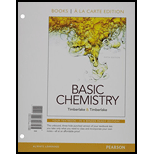
Concept explainers
Interpretation:
The final pressure of isoflurane in atmosphere should be calculated when the gas is warmed to a temperature of 22°C, under conditions of constant volume and amount of gas. Given that the gas is at initial pressure of 1.8 atm and temperature of 5°C.
Concept introduction:
► The relation between pressure (P) and temperature (T) of a gas under constant volume and amount of the gas is represented through Gay-Lussac’s Law.
► As per Gay-Lussac’s law, pressure is directly related to temperature:
► The standard units for pressure is atmosphere (atm) and temperature kelvin (K)
► Pressure conversions:
1 torr = 1 mmHg
1 atm = 760 torr = 760 mmHg
Temperature conversion:
K =°C + 273 (or) °C = K - 273
Given:
Initial pressure P1 = 1.8 atm
Initial temperature T1 = 5°C = (5 + 273) K = 278 K
Final temperature T2 = 22°C = (22 + 273) K = 295 K
Final pressure = P2
Want to see the full answer?
Check out a sample textbook solution
Chapter 11 Solutions
Basic Chemistry, Books a la Carte Plus Mastering Chemistry with Pearson eText -- Access Card Package (5th Edition)
 ChemistryChemistryISBN:9781305957404Author:Steven S. Zumdahl, Susan A. Zumdahl, Donald J. DeCostePublisher:Cengage Learning
ChemistryChemistryISBN:9781305957404Author:Steven S. Zumdahl, Susan A. Zumdahl, Donald J. DeCostePublisher:Cengage Learning ChemistryChemistryISBN:9781259911156Author:Raymond Chang Dr., Jason Overby ProfessorPublisher:McGraw-Hill Education
ChemistryChemistryISBN:9781259911156Author:Raymond Chang Dr., Jason Overby ProfessorPublisher:McGraw-Hill Education Principles of Instrumental AnalysisChemistryISBN:9781305577213Author:Douglas A. Skoog, F. James Holler, Stanley R. CrouchPublisher:Cengage Learning
Principles of Instrumental AnalysisChemistryISBN:9781305577213Author:Douglas A. Skoog, F. James Holler, Stanley R. CrouchPublisher:Cengage Learning Organic ChemistryChemistryISBN:9780078021558Author:Janice Gorzynski Smith Dr.Publisher:McGraw-Hill Education
Organic ChemistryChemistryISBN:9780078021558Author:Janice Gorzynski Smith Dr.Publisher:McGraw-Hill Education Chemistry: Principles and ReactionsChemistryISBN:9781305079373Author:William L. Masterton, Cecile N. HurleyPublisher:Cengage Learning
Chemistry: Principles and ReactionsChemistryISBN:9781305079373Author:William L. Masterton, Cecile N. HurleyPublisher:Cengage Learning Elementary Principles of Chemical Processes, Bind...ChemistryISBN:9781118431221Author:Richard M. Felder, Ronald W. Rousseau, Lisa G. BullardPublisher:WILEY
Elementary Principles of Chemical Processes, Bind...ChemistryISBN:9781118431221Author:Richard M. Felder, Ronald W. Rousseau, Lisa G. BullardPublisher:WILEY





